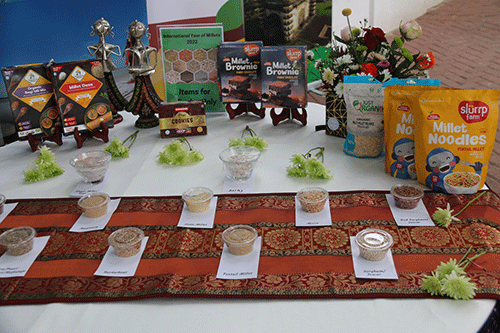The High Commission of India in Namibia, in collaboration with the international relations ministry,commemorated the International Year of Millets, raising awareness of the importance of millets.
Indian High Commissioner to India Mandarapu Subbarayudu said within the ambit of the International Year of Millets, the joint event this week aimed to raise awareness of the importance of millets and the benefits of consuming it, and encourage production and consumption of the produce.
“The goal is to highlight the enormous potential of millets to diversify food systems, and enhance food security across the globe. Grown and consumed in India, Namibia and other countries, millets are an important component of the efforts to achieve Sustainable Development Goal (SDG) 2 (Zero Hunger) and SDG 3 (Good Health and Wellbeing),” stated Subbarayudu.
The United Nations General Assembly has declared 2023 as the International Year of Millets, with the aim of increasing public awareness of the health benefits of millets and their suitability for cultivation under tough conditions, marked by climate change.
Subbarayudu said agriculture is an important part of the African Union’s Agenda 2063.
Cooperation can unlock the potential of the agri-food systems in support of the 2030 Agenda for Sustainable Development through viable public-private partnerships.
India had proposed to the United Nations to declare 2023 as an International Year of Millets (IYM).
The proposal of India was supported by 72 countries.
The United Nations General Assembly (UNGA) declared 2023 as International Year of Millets on 5 March 2021.
Subbarayudu added: “Millets are one of the oldest foods known to humans. Millet is a common term to categorise small-seeded grasses that are often termed nutri-cereals or dryland-cereals and includes sorghum, pearl millet (mahangu), finger, little, foxtail, Proso, Barnyard, Kodo and others.”
He noted that millets are the staple crops adapted to dryland agroecologies of the arid and semi-arid tropics.
The international relations ministry’s executive director, Penda Naanda, said millets or mahangu, as it is commonly known locally, is the major staple food for over 50% of the Namibian population.
He added that science and research have proven that millets are an important crop for food security, particularly in areas where climate change and other factors have made other crops, such as rice and wheat, difficult to grow.
“Despite their many benefits, millets have been neglected in recent years in favour of more profitable crops, such as rice and wheat, which has led to a decline in millet cultivation,” Naanda observed.
A dietician at the health ministry, Mari-Louise Jeffery, said she works with patients who suffer from various health conditions – and most of them are closely related to diets.
“This is either in the form of a nutrition or non-communicable disease like diabetes, cancers and heart diseases, or under-nutrition in the form of wasting and stunting.
We must remember that nutrition plays a very important role in these diseases – not only in prevention but also in how we manage it,” she stated.
Jeffery added that food substances like pearl millet (mahangu) are rich in protein, fibre and micronutrients, which play a role in growth, especially brain development in children, and ultimately the prevention of malnutrition.
“Non-communicable diseases, along with food insecurities, have been a major global health problem. The world is moving backwards when it comes to food insecurity. So, because of the resilience and ability to withstand harsh conditions, millets have great potential to improve the food security status and biodiversity of Namibia,” she continued.
Millet grains are rich sources of nutrients like carbohydrates, protein, dietary fibre and good-quality fat, and they have substantially higher amounts of minerals like calcium, potassium, magnesium, iron, manganese, zinc and B complex vitamins, making them a preferable choice over cereal grains.
Millets can also help tackle health challenges, such as obesity, diabetes and lifestyle problems, as they are gluten-free, have a low glycemic index and are high in dietary fibre and antioxidants.
– psiririka@nepc.com.na


